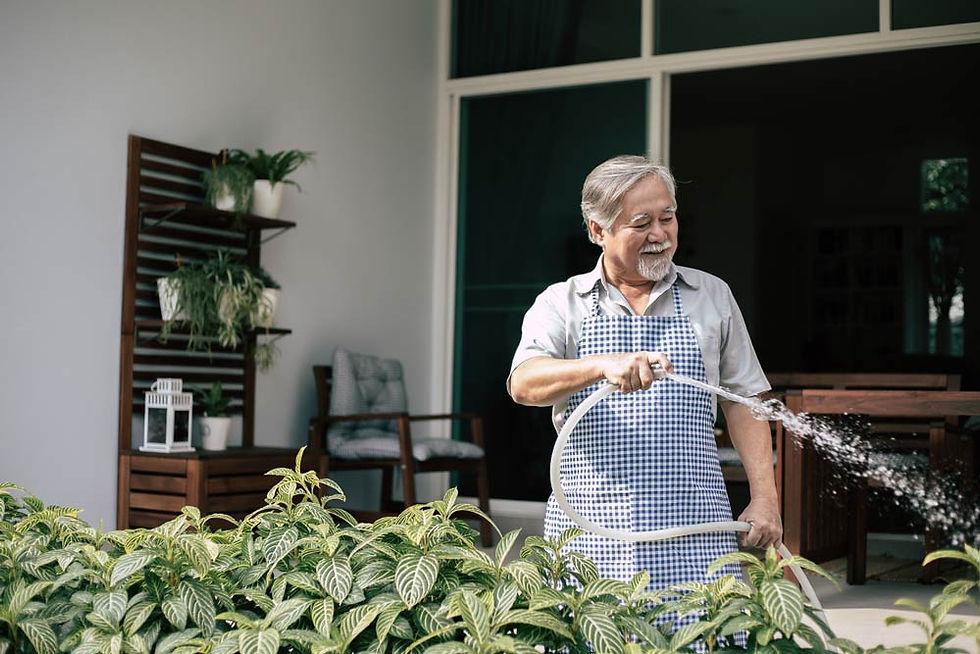Seeking a Simpler Life After 70
- Katharine Esty

- Jun 29, 2025
- 4 min read
Managing Schedules, Decluttering, and Finding Peace of Mind

I used to believe that as I got older, I would naturally leave my problems behind. I thought that once I stopped working, my children were grown, and I had fewer responsibilities, I would find serenity. However, nothing is ever that simple.
I have noticed three common issues that become different and more challenging as we age. First, how do we manage our schedules effectively? Secondly, how do we deal with our possessions? And, finally, how do we find peace of mind? We long for a simpler life and we know we must keep adapting to the changes that are taking place in our lives.
Issue: Managing our schedules
Despite having fewer responsibilities, many of us still feel overwhelmed and stressed. As we reach our 70s and 80s, everyday tasks take longer than they used to — getting dressed, reading a book, writing an email, and managing our finances. Additionally, we have more medical appointments to attend. It feels like we can never catch up.
For some, the constant influx of emails is the most stressful aspect of daily life. For others, it is the ongoing routines and chores. By the end of each day, many of us find ourselves questioning if what we accomplished truly mattered.
Tips: How to simplify our lives
I’ll start with emails and text messages. Many of us have become slaves to our phones and the constant flow of messages. The general expectation for quick turnarounds adds to our stress.
Instead of constantly monitoring my phone, I have found that it is possible to set specific times during the day — maybe two or three — when I check my emails and messages. Although this was very challenging, it was also quite liberating.
Taking more time-outs for ourselves is another essential. A short pause creates a sense of having time and not feeling rushed. Scheduling mini-breaks can also be effective. I designate a “personal vacation” for myself by blocking out several hours or even a whole day on my calendar. I commit to doing only what I enjoy — no unpleasant chores and no work at all. Although it can be challenging to relax and enjoy ourselves, it is important for our well-being.

I suggest eliminating multitasking. Research shows that we are not very good at it as we age. It can even be dangerous for us; for example, when driving where it’s crucial to focus solely on the road. Additionally, I suggest avoiding podcasts while walking in the woods. There is so much to enjoy and observe in nature and in our gardens. We need to take time away from the constant flow of information and truly savor the task at hand.
It’s important for us to look at our commitments and eliminate some of the activities we don’t really enjoy anymore. You may also decide to cut something that is enjoyable but it is just too much. Giving up my second book group was like that. I loved the reading and the people, but with my writing commitments, it was just too much pressure to finish all of the reading. And what a relief when I finally was able to leave the group.
Issue: Too much clutter
For many of us, over our long lives, we have accumulated a vast array of things. We receive gifts, purchase new items, and before we know it, our closets become overstuffed. I had a large catch-all closet that was filled with bedspreads, unused clothes, gifts meant for future occasions, boxes I saved for later, Christmas decorations, and old picture frames. It became so full that I could no longer step inside.
Clutter can be depressing and eventually becomes a significant problem. When faced with it, we often don’t know where to begin, but we know it’s making us miserable.

Tips: “Just start”
The importance of overcoming the initial hurdle of starting can not be overstated. Just acknowledging that clutter is a problem is progress. The first step is to decide you will declutter.
The next step is to limit your purchases of unnecessary items and start giving away what you no longer need. I have discovered that there is unexpected joy in visiting a grandchild or friend and seeing something I gave them from my belongings. If no one wants your items, there are several organizations that will gladly accept donations.
When it comes to cleaning up clutter, the “just start” technique can be very effective for those of us who struggle with procrastination. I often find myself avoiding tasks like managing my finances and tackling my taxes, as well as decluttering my closets.
For example, not long ago, I decided to kick off a decluttering campaign by focusing on the closet I couldn’t get into. To get myself going, I said to myself, “You only need to work for 10 minutes.” After a couple of unsuccessful attempts, I finally managed to begin. Once I got started, I found that I wanted to keep pushing onward. However, I stuck to my plan and didn’t overwork myself. A few days later, I was able to continue my decluttering effort. I am proud to say that I can now walk easily into that closet!
Issue: Managing difficult and challenging feelings
The uncertainty of our world is disheartening. The daily news is usually quite troubling. Additionally, as we age, we continue to have times when we feel anxious, depressed, or helpless.

Tip: Finding peace of mind
Over the last fifteen years, meditation has been the centerpiece of my journey toward serenity. It has truly been life-changing for me. However, I still struggle to meditate regularly. About four years ago, I began attending an online daily Buddhist meditation. I have found this short session to be a wonderful way to ground myself in the present moment and prepare for the rest of my day.
I recommend the apps Calm or Headspace to you, my readers, as helpful for those of you who want to learn how to meditate. But taking time for quiet contemplation or walking in nature are also good ways to calm the mind and re-center.
I close with words from Henry David Thoreau:
“Our life is frittered away by detail. Simplify, simplify.”







An app that I use is Insight Timer. It has lots of meditations from many different styles: guided, zen, buddhist, hindu, breathing, visualizations. There is a free version, and a small fee for premium. With this app, I have explored different styles, and different teachers, and maintained a daily practice. I particularly enjoy Tony Brady who guides meditations focused on gratitude.